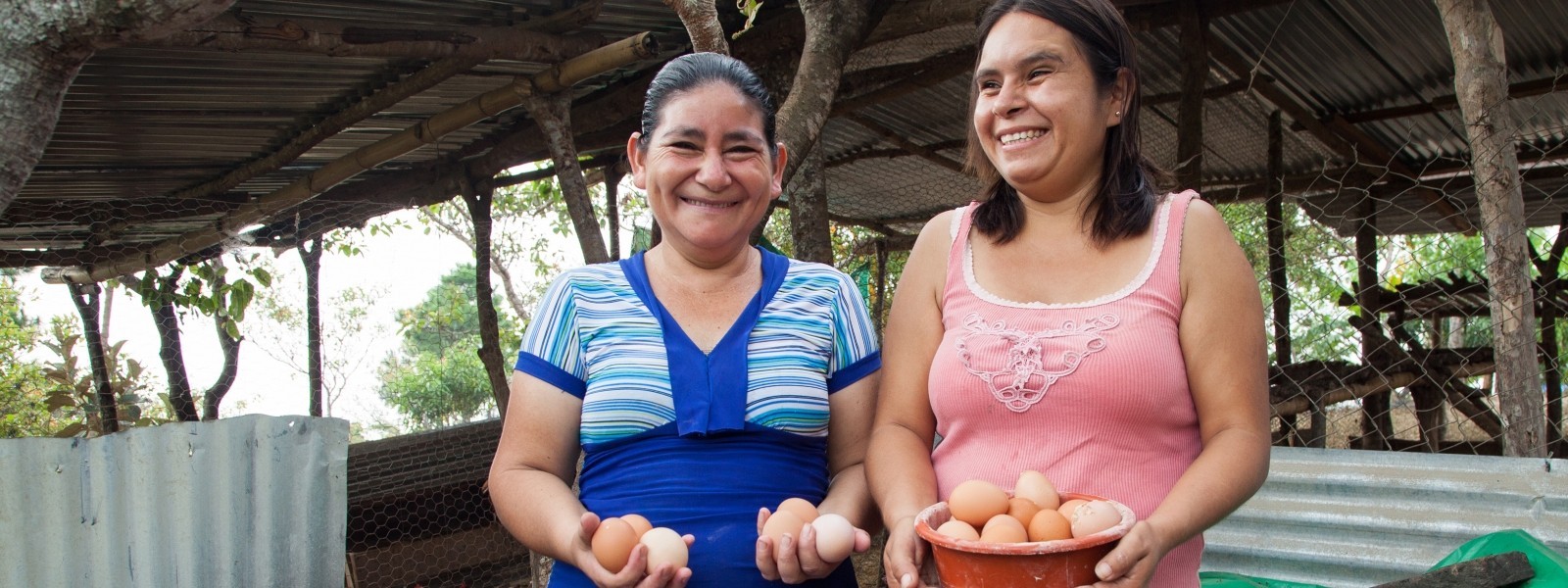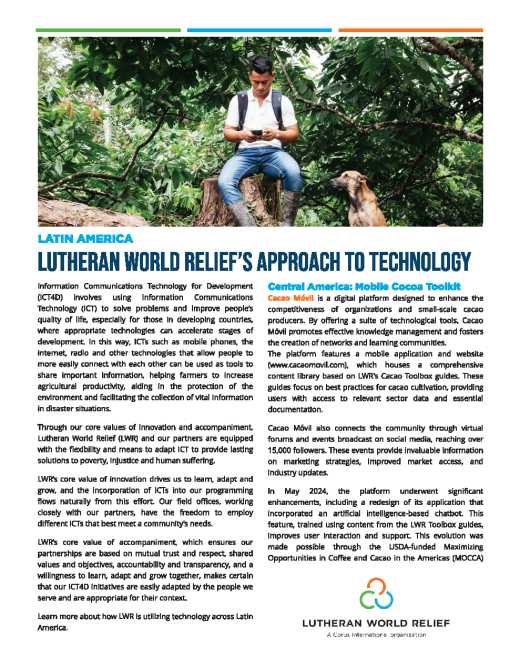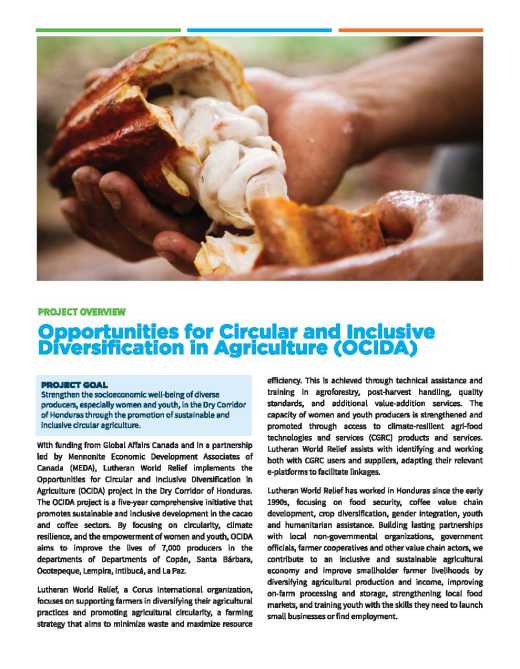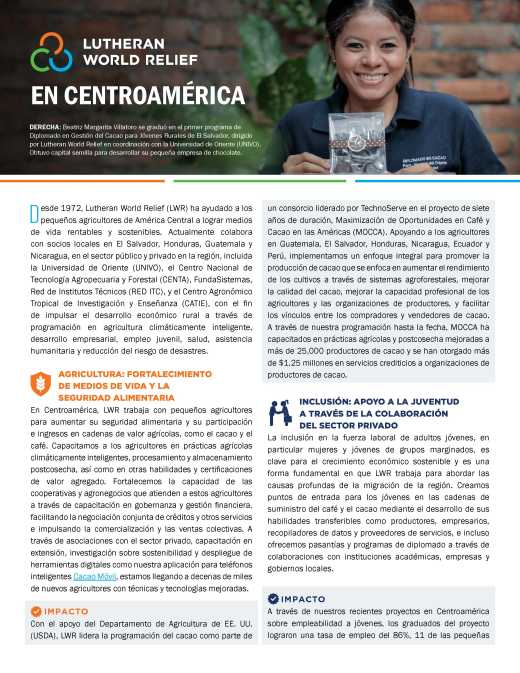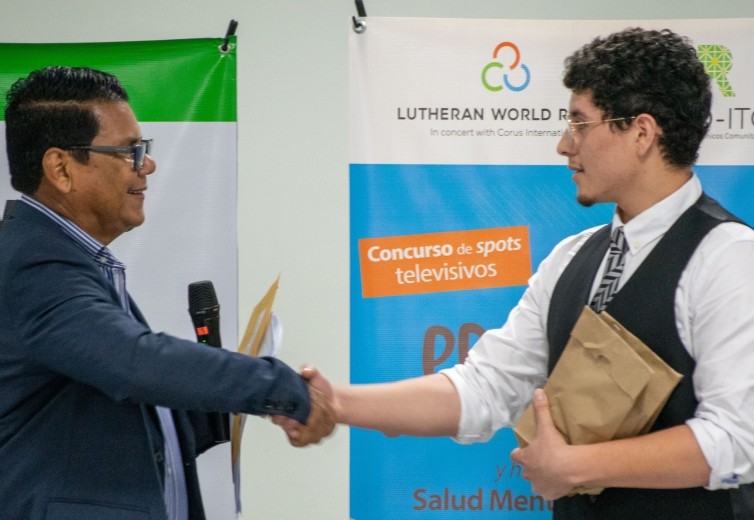Climate change and food insecurity are severely impacting rural livelihoods in Honduras and increasing rates of migration out of the country. Weather extremes are now a regular occurrence in the country, as droughts dry up rural farmer livelihoods, hurting an agricultural sector that employs 30 percent of the total labor force. The frequency of climate-related humanitarian crises has escalated with recent hurricanes like Eta and Iota devastating homes, crops and infrastructure. As the second poorest country in Central America, Honduras is experiencing soaring levels of out-migration and urbanization, factors that increase poverty and threaten a vulnerable agricultural sector. Lutheran World Relief is committed to building hope for the next generation and supporting Hondurans to achieve a stable and dignified life within their own country.
Lutheran World Relief has worked in Honduras since the early 1990s, focusing on food security, coffee value chain development, crop diversification, gender integration, youth and humanitarian assistance. Building lasting partnerships with local non-governmental organizations, government officials, farmer cooperatives and other value chain actors, we contribute to an inclusive and sustainable agricultural economy and improve smallholder farmer livelihoods by diversifying agricultural production and income, improving on-farm processing and storage, strengthening local food markets, and training youth with the skills they need to launch small businesses or find employment.
Lutheran World Relief helps rural communities strengthen their resilience against the increasingly severe effects of climate change, water scarcity and unfavorable market systems.
Project Highlights
With funding from Global Affairs Canada and in a partnership led by Mennonite Economic Development Associates of Canada (MEDA), Lutheran World Relief implements the Opportunities for Circular and Inclusive Diversification in Agriculture (OCIDA) project in the Dry Corridor of Honduras. The OCIDA project is a five-year comprehensive initiative that promotes sustainable and inclusive development in the cacao and coffee sectors. By focusing on circularity, climate resilience, and the empowerment of women and youth, OCIDA aims to improve the lives of 7,000 producers in the departments of Departments of Copán, Santa Bárbara, Ocotepeque, Lempira, Intibucá, and La Paz. The project focuses on supporting farmers in diversifying their agricultural practices and promoting agricultural circularity, a farming strategy that aims to minimize waste and maximize resource efficiency. This is achieved through technical assistance and training in agroforestry, post-harvest handling, quality standards, and other value-addition services. The capacity of women and youth producers is strengthened and promoted through access to climate-resilient agri-food technologies and services (CGRC) products. Lutheran World Relief assists with identifying and working both with CGRC users and suppliers, adapting their relevant e-platforms to facilitate linkages.
In partnership with Red Institutos Comunitarios (Red-ITC), Lutheran World Relief implements the Creating Spaces for Youth Employability (CREE) project, building on the work of Youth in Agri-business: Ensuring the Employment of Tomorrow that emphasized climate change adaptation while improving income and job opportunities in the agricultural sector for youth within Honduras’ Dry Corridor. The CREE project trains 1,100 young participants from 22 municipalities in seven departments of Honduras. In addition to supporting life skills and context-relevant work competencies, the project prioritizes the use of information and communication technology for employability and entrepreneurship. By piloting an innovative virtual platform, Empleando Mentes (or “Employing Minds” in English), the project integrates technology and extension services to support holistic well-being. The Empleando Mentes digital platform connects young people with livelihoods assistance and online community while providing personalized virtual psychosocial support. It offers practical, easily digestible information on soft skills, self image, resilience, leadership, inclusion and other essential topics for holistic human development. The platform employs engaging audiovisual formats to capture the attention of young people in the region, and it also serve as a platform for free professional guidance on mental and emotional health topics.
Lutheran World Relief is working in rural Honduras to address gaps in youth employment opportunities in the coffee sector through strengthening youth’s transferable skills as technical advisers, rural promoters and coffee quality experts according to market demand; creating new job opportunities for trained youth; and facilitating opportunities for youth entrepreneurs to realize their potential through new agri-business ventures.
Lutheran World Relief and local partner El Instituto Hondureño del Café (IHCAFE) help youth find employment or become small business entrepreneurs in the coffee sector, building their skills in coffee production and post-harvest handling practices. Youth are learning about improved cultivation techniques and how to use technology, such as IHCAFE’s digital coffee app CafeMovil, which provides instant access to an online toolbox of coffee cultivation manuals that supplies in-depth responses to coffee cultivation questions.
As part of the USAID-led Feed the Future initiative, Lutheran World Relief adopted an innovative program strategy to influence municipal regulations, institutional policies and social norms in Western Honduras to reduce gender-based gaps in access to resources for productive enterprises. In addition to influencing policy and empowering women and women’s groups, Lutheran World Relief used an innovative masculinities methodology to promote changes in men’s attitudes towards women’s political and economic participation. By creating a more inclusive local agricultural economy, these activities strengthened local governments, established effective community councils, increased female leadership and channeled national investments to the region into infrastructure and socio-economic programs.
In the department of Francisco Morazán, Lutheran World Relief worked to establish sustainable community agricultural production in an area unable to produce sufficient food to meet household requirements. Activities included: sustainable water management; distribution and training with improved seeds in collaboration with the Secretary of Agriculture; and establishment of demonstration plots using tunnel greenhouses and organic fertilizers. Lutheran World Relief helped establish committees for the long-term management of natural resources and exchange of information. Food security projects in the municipalities of Copán Ruinas, Santa Rita and Cabañas Copán benefited Chortí Maya Indigenous groups and ensured community members were equipped with improved production practices in family vegetable gardens and in the post- and pre-harvest processing of coffee for cash sale.
MOCCA is a multi-country initiative led by Technoserve and funded by the U.S. Department of Agriculture that helps Latin American farmers overcome the barriers to effectively rehabilitate and renovate their coffee and cocoa plants – increasing their productivity while improving their marketing capacity, incomes and livelihoods. Honduras is one of six countries that is part of the 5-year, $10.5 million project. Lutheran World Relief leads MOCCA’s cacao programming, helping farmers sell more at better prices, improving farmer productivity and enhancing sector coordination to drive competitiveness and growth.
Amid the global COVID-19 pandemic, Hurricanes Eta and Iota destroyed the homes and livelihoods of countless Honduran families. Lutheran World Relief provided emergency shelter, food and WASH assistance as well as psychosocial support to allow families to start rebuilding their lives. LWR also focused on hygiene responses to help mitigate the spread of COVID-19 immediately after the storms.
With emergency response funding from Margaret A. Cargill Philanthropies, Lutheran World Relief improved community resilience through organizational strengthening in disaster risk management in the drought-stricken department of Lempira. With the involvement of women- and youth-led networks, Lutheran World Relief collaborated with emergency committees at the community and municipal levels to promote the adoption of innovative practices and technologies for water harvesting and management. In the same region, Lutheran World Relief provided emergency food aid and personal protective equipment to meet critical household needs resulting from income loss amidst the COVID-19 pandemic.
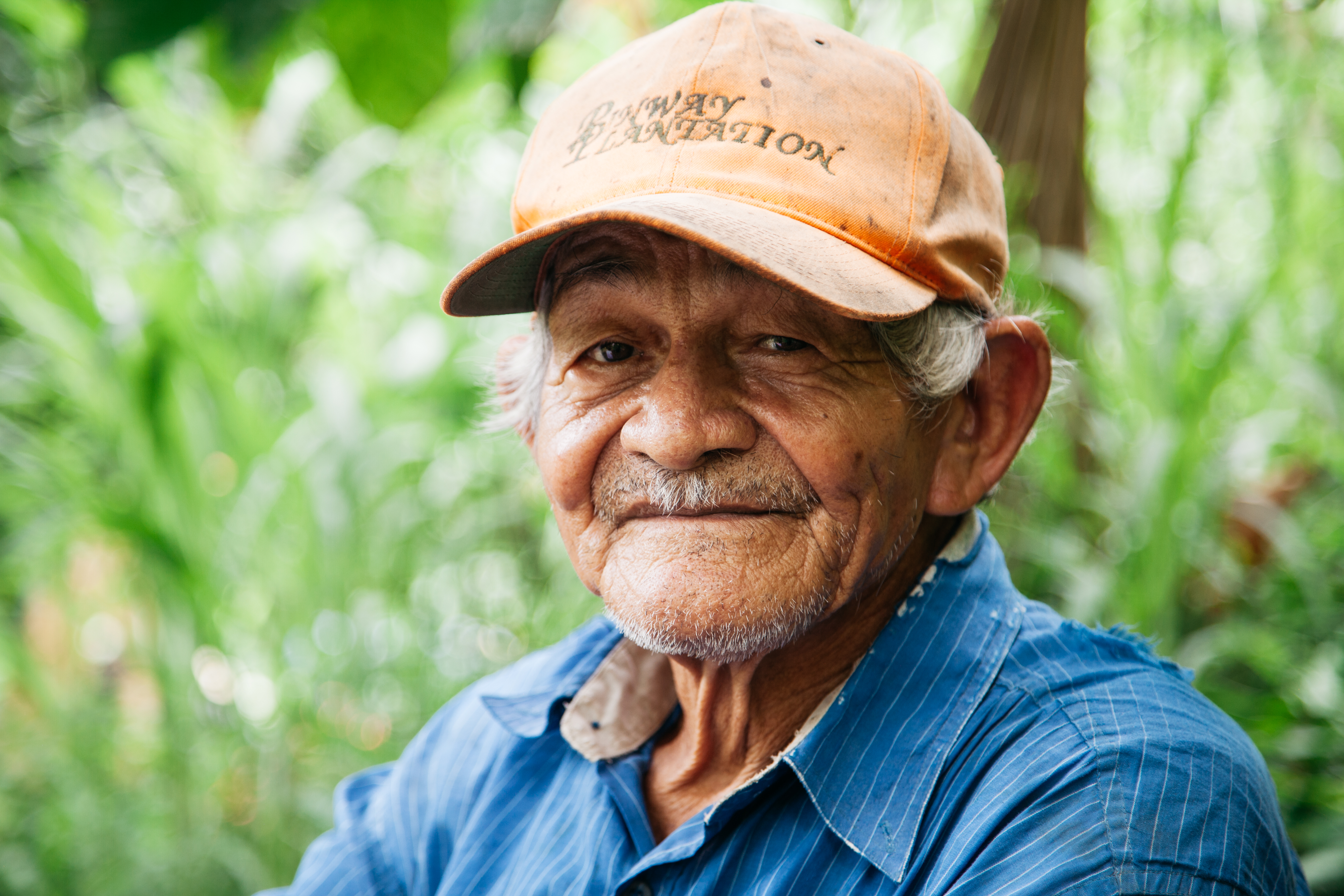
The Corus Effect
Lutheran World Relief is part of Corus International, an ensemble of global leaders in international development and humanitarian assistance. In addition to Lutheran World Relief, the Corus family of organizations includes global public health agency IMA World Health, U.K.-based technology for development company CGA Technologies, impact investing group Ground Up Investing, and direct trade company Farmers Market Brands.
We operate as permanent partners, integrating expertise, disciplines, approaches and resources to overcome global health challenges, develop productive and stable economies, improve resilience in the face of climate change, and respond to natural disasters and humanitarian crises.
With the support of our family’s diverse set of partners and funding – from multi- and bilateral institutions and foundations to the private sector and individuals – we invest in solutions that are innovative, scalable, holistic and move the needle towards transformational change.


